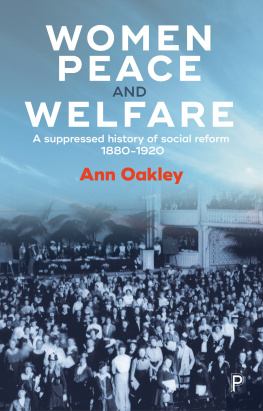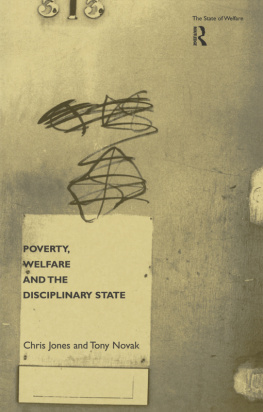Copyright 2002 University of Pennsylvania Press
All rights reserved
Printed in the United States of America on acid-free paper
10 9 8 7 6 5 4 3 2 1
Published by
University of Pennsylvania Press
Philadelphia, Pennsylvania 19104-4011
Library of Congress Cataloging-in-Publication Data
Western welfare in decline : globalization and womens poverty /
edited by Catherine Kingfisher.
p. cm.
Includes bibliographical references and index.
ISBN 0-8122-3668-8 (cloth : alk. paper)
ISBN 0-8122-1812-4 (pbk. : alk. paper)
1. Public welfare. 2. Social policy. 3. Poor womenGovernment policy. 4. Welfare recipientsGovernment policy. I. Kingfisher, Catherine Plissier.
HV51 .W47 2002
361.65dc21
2002020309
For
John Plissier
and
R. L. B. (19571991)
Chapter 1
Introduction
The Global Feminization of Poverty
Catherine Kingfisher
The 1992 World Bank Report argued that Women must not be regarded as mere recipients of public support. They are, first and foremost, economic agents (IBRD 1992:60). This claim captures a key discursive shift in the currently unfolding transformation from Keynesian and developmental to neoliberal forms of governance. In this transformation, which is witnessing exponential growth in the feminization of poverty, similar increases in poverty rates among women in advanced welfare state societies may be interpreted in relation to an analogous, internally initiated restructuring, usually entailing cuts in social provisioning. In both cases, public services are put under threat, and in both cases it is poor women who disproportionately shoulder the burden of service reductions while they struggle to fill in the gaps left by a retreating state. These parallels may in turn be situated in the larger context of the global spread of neoliberal approaches to economic, social, and state organization.
Although situated in the context of a global feminization of poverty, the focus of this book is on restructuring and womens poverty in western welfare states, with particular emphasis on the situation of poor single mothers.recently has a literature begun to develop on the comparative analysis of gender and the western welfare state (see especially Orloff 1993; Casper, McLanahan, and Garfinkel 1994); and, more importantly for the purposes of this collection, on the comparative analysis of gender and welfare state restructuring (see especially Bakker 1994b, 1996; OConnor, Orloff, and Shaver 1999; Sainsbury 1996).
This collection contributes to this groundbreaking and now burgeoning literature on womens well being in restructuring welfare states in two ways. First, it takes what I refer to as the culture of neoliberalism as a particular focus of investigation, both theoretically and practically: theoretically, by exploring the gendered nature of the basic tenets of neoliberalism, and practically, by documenting how neoliberalism articulates with local/national cultures in specific relation to poverty policy. Secondly, the book works to situate the analysis of neoliberal culture in the context of economic and cultural globalization; in other words, globalization, frequently mentioned in passing in the literature on welfare reform, becomes, like neoliberalism, a focus of investigation in itself. The general argument that neoliberalism and globalization are inextricably tied is maintained throughout the book. Briefly, the argument claims that a key feature of economic and cultural globalization is the spread of specifically neoliberal forms of governance (Gill 1995; Mishra 1999; Teeple 1995), characterized by an international shift in the direction of increasing marketization, a redrawing of the public/private distinction, valorization of possessive individualism, and shifts in state expenditure (often accompanied by increasing state interference) in social arenas. An understanding of the global feminization of poverty thus requires an analysis of neoliberalism: analysis of neoliberalism as a cultural system, analyses both of neoliberalism as a movement and of the movement of neoliberalism across cultural space (globalization), and an analysis of its contradictions and disjunctures that provide entry points for intervention and resistance.
With reference to their situatedness in a specifically global terrain, then, this book explores the discourses and practices of welfare state restructuring in relation to poor single mothers in the United States, Canada, Britain, Australia and Aotearoa/New Zealand.tings. Again, it is important to underscore that the analysis here is situated in terms not just of comparison, but also specifically of globalization. While comparative frameworks endeavor to uncover similarities and differences, they do not tend, in general, to situate these relationships in terms of transnational patterns (although see Esping-Andersen 1996; Mishra 1999). Theories of globalizationof increasing and accelerated transnational interdependencies and cross-fertilizations of politics, culture, and economicsprovide this situatedness and also create a space for theorizing the underpinnings of the similarities and differences that comprise the focus of the comparative project.
It is also crucial to point out that policy, as analyzed here, is theorized as inherently cultural, insofar as it is based on culturally and historically specific discourses of gender, the division of labor, public and private, and whatever other phenomena happen to be locally relevant. Identities, roles, needs, and dependenciesand the various approaches taken to encourage, support, or ameliorate themmust be recognized as cultural constructions, reflecting and instantiating locally received and contested views that are always already reflective of and in conversation with other (perhaps globalizing) constructions. This collection is thus one response to the call for an anthropology of welfare (Russell and Edgar 1998); that is, for an approach that emphasizes the construction, negotiation, and contestation of meanings that underlie, inform, and reflect the material realities of welfare systemswhich are, after all, a product of, and response to, power relationships in society (Russell and Edgar 1998:2).
Restructuring Is to the West What Structural Adjustment Is to the Rest
Marshall Sahlins (1972) uses a west/rest binary to distinguish between the role of money in the west and kinship in the rest. This formulation may be used here to refer to gross parallels in processes of structural adjustment (the rest) and welfare state restructuring (the west). This is not to claim that either the west or the rest is homogeneous. Indeed, there is enough heterogeneity within each category to render the categories themselves useless except as limited heuristic devices; and a key goal of this collection is, in fact, to explore precisely the heterogeneity within and among western welfare states. However, just as a west/rest binary is of limited value, so a homogeneity/heterogeneity opposition can lead to an unfortunate partiality that fails to capture complexity and nuance. On the other hand, it remains the case that west/rest and homogeneity/heterogeneity binaries can serve as useful points of entry or departure. My intent here is to do both: to capture both similarities and differences, to explore both generalities and specificities, rather than only one or the other. This requires a willingness to live with a fundamentally unresolvable but hopefully illuminating tension.










